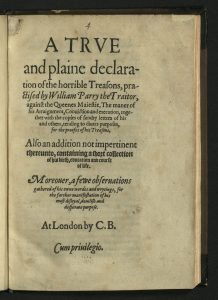
“The Queene of Scotland is your prisoner, let her be honorably entreated, but yet surely guarded.” – William Parry
A true and plaine declaration of the horrible…
At London by C. Barker Cum priuilegio, 1585
First edition, second issue
A contemporary report of William Parry’s plot to assassinate Queen Elizabeth I (1533-1603), including an account of his discovery, imprisonment, confession, and execution (2 March 1585) together with documents of the confession of Parry’s fellow-conspirator, Edmund Neville (ca. 1555-ca. 1620), outlining in detail Parry’s plans to kill Elizabeth with his dagger in her private gardens or, failing that, to shoot her at St James’; and Parry’s confession, written by his own hand before Walsingham in the Tower of London.
This is followed by two more letters of confession by Parry, the first addressed to the queen; the next addressed to Burghley and the Earl of Leicester. Also included are documents that further incriminate Parry and provide details of the early stages of his plotting. The first of these is a letter written by the Jesuit William Crichton (from his imprisonment at the Tower) recalling a conversation with Parry concerning the lawfulness of assassinating the queen.
Finally, a letter to Parry by Ptolomeo Galli, Cardinal of Como, in which he approves a letter that Parry had written to Pope Pius V, allegedly offering to assassinate the queen, and for which service the Pope granted him a plenary indulgence. Following the account of Parry’s trial and execution by hanging, the printer has added “A few observations gathered out of the very words and writing of William Parry, the traytour, applied to prove his trayterous coniuration, with a resolute intent, imagination, purpose, and obstinate determination to have killed her Maiestie.” This account of Parry’s efforts implicates the Jesuits, English recusants and seminarians, and the Pope himself.
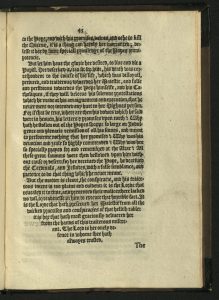
“But the matter is cleare, the conspiracie, and his traiterous intent it too plaine and evident: it is the Lorde that reuealed it in time, and preuented their malice: there lacked no wil, or readinesse in him to execute that horrible fact. It is the Lorde that hath preserued her Maiestie from all the wicked practises and conspiracies of that hellish rable: it is hee that hath most graciously deliuered her from the hands of this traiterous miscreant. The Lord is her onely defence in whome shee hath alwayes trusted.”
The revelation that Parry conceived of his plan by reading the works of William Allen, English Cardinal of the Roman Catholic Church, prompted this editorial note: “See how the smoothe words of that Catholique booke are enterpreted and conceived. One Spirite occupieth the Catholique reader with the Catholique writer, and therefore can best expound the writers sence in his readers mouth, even to bee a booke fraught with emphaticall speeches of energeticall perswasion to kill and despose her maiestie, and yet doeth the hypocrite writer, that traitour Catholique, dissemble and protest otherwise.”
The little booklet ends with three prayers for Elizabeth, the last of which “vsed in the Parliament onely.”
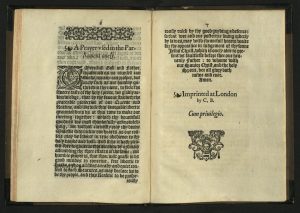
“…we gladly acknowledge, that by thy fauour standeth the peaceable protection of our Queene and Realme, and likewise this fauorable libertie graunted unto us at this time to make our meeting together…”
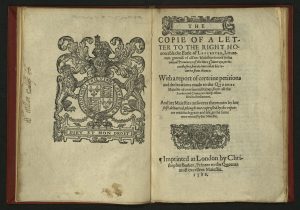
Copie of a letter to the right honourable the…
London: By Christopher Barker, printer to the Queenes most excellent Maiestie, 1586
First edition, variant
DA356 S27 1586
This slim volume contains printed documents of an exchange between Parliament and Queen Elizabeth on the proposed execution of Mary, Queen of Scots, beginning with a letter to the Earl of Leicester dated November 25th, 1586 and signed by R. C. (Robert Cecil) in which Cecil announces that he has transcribed “the speaches delivered by the Queene’s most excellent maisestie in a late and weightie cause dealt in this parliament” together with the “petitions presented to hir Maiestie and the 12th and 24th of November at Richmond by the Lord Chauncelour and Speaker.”
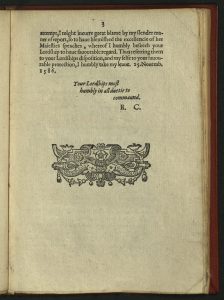
In the first petition, Elizabeth is urged to take action against the Scottish Queen for her traitorous actions. A number of “divers apparent and imminent dangers that may grow to her Maiesties most royal person and her realme” are enumerated. Chief among these are Mary’s confessed complicity in the plot of Anthony Babbington to assassinate the queen, as well as her intention to return England “into the thralldome of Popish tyrannie.”
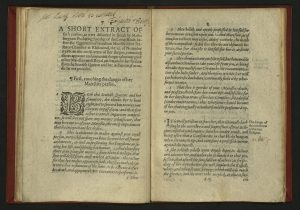
“She is obdurate in malice against your royall person, notwithstanding you have shewed her all fauour and mercie, as well in preseruing her kingome, as saving her life, and faluing her honour. And therefore there is no place for mercie; since there is no hope that shee will desist from most wicked attempts…”
The first petition is followed by Elizabeth’s response, in which she promises to give the matter “due consideration” but declines to offer an immediate resolution: “I haue had goode experience and tryall of this world: I know what it is to be subiect, what to be Soueraigne: what to haue good neighbors, and sometime meete euill willers. I haue founde treason in trust, seene great benefits litle regarded, & in stead of gratefulness, courses of purpose to crosse. These former remembrances, present feeling and future expectation of euils, I say, haue made me thinke, An euill, is much the better, the lesse while it endureth: and so, them happiest that are soonest hence: & taught me to beare with a better minde these treasons, then is common to my sexe: yea, with a better heart perhaps, then is in some men.”
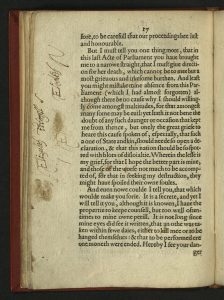
“But I must tell you one thing more, that in this last Acte of Parliament you haue brought me to a narowe straight, that I must giue direction for her death, which cannot be to mee but a most grieuous and irksome burthen.”
A few days after this exchange, Elizabeth “in some conflict with herself what to do” asked the Parliament to find “some other way of remedy” than the execution of Mary.
In the resultant second petition (24th November), Parliament announced that further deliberations upon the matter yielded no alternate solution that would ensure the safety of queen and country. The queen was once again urged to authorize Mary’s execution.
Elizabeth, in her second reply, offers “an answere without answere”: “It was of a willing minde & great desire I had, that some other means might be found out, wherein I should have taken more comfort, than in any under thing under the Sunne. And since now it is resolved, that my suretic can not bee established without a Princesse ende, I have just cause to complaine, that I, tho have in my time pardoned so many Rebels, winked at so many treasons, and shoulde nowe be forced to this proceeding, against such a person.”
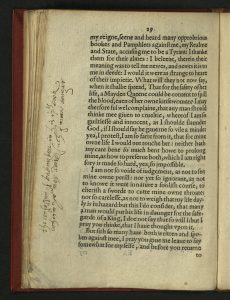
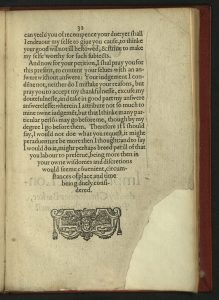
“…an answere without answere…”
Elizabeth’s equivocal response to the November 24th petition concludes the present work. Soon after, on December 4th, Parliament obtained a public proclamation from Elizabeth of the sentence of death. Mary was executed on February 8th, 1587.
Rare Books copy has contemporary handwritten annotations in the text. In the first, the annotator directs the reader to the confession of Anthony Babington, who had conspired to kill Elizabeth and place Mary, Queen of Scots on the English throne. Babington was captured and executed in 1586, the year that this book appeared. Three other annotations give the names of contemporary owners.
A recent owner, Harlech Brogyntyn, one of the barons of Brogyntyn Hall, a mansion in the parish of Selatyn, northwest of Oswestry in Shropshire, England, left the following note on the flyleaf of the current binding. The estate had been a family home since the sixteenth century. A further note, on the second flyleaf states that the book was “found bound in damaged limp vellum in a bundle in the cellar…”
“This volume is of great historical interest in that it shows the pressure put by both Houses of Parliament on Queen Elizabeth to “eliminate” Mary Queen of Scots in the autumn of 1586. (The actual execution took place in 1587.)
The arguments are set-out (1) by [the Lord Chancellor] for the Lords…much perturbed by the revelation of the “Babington” plot…Queen Elizabeth’s characteristic replies are prefaced by a letter signed R. C. to Lord Leicester. Lord Leicester had been in Flanders during these events and this volume was printed by the “official” printer to acquaint him with what had passed in this matter in his absence.
H”
Sir Robert Owen of Brogyntyn (d. 1698) was a bibliophile who followed a family tradition of patronage of poets and collecting printed English literature. Later family members continued collecting early printed books. The library also had a collection of manuscripts, possibly culled from other estate libraries in the surrounding area. The third Lord Harlech gave thirty Welsh language manuscripts to the National Library of Wales in 1934, making it the largest collection of manuscripts in Welsh at that time. The fourth Lord Harlech gave the National Library another fifty-nine manuscript in 1935 and more in 1945. The remaining manuscripts were purchased from the sixth Lord Harlech in 1993.
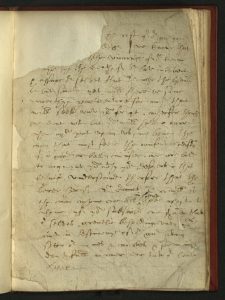
Like this:
Like Loading...
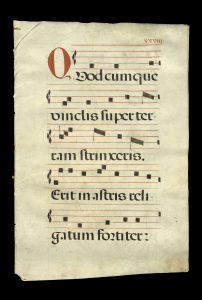
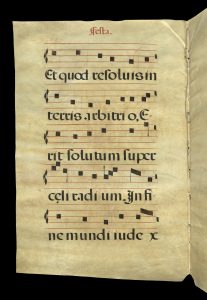
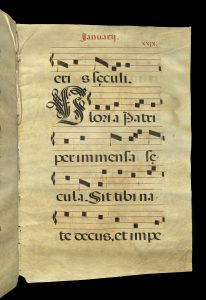
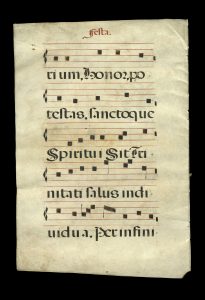











You must be logged in to post a comment.